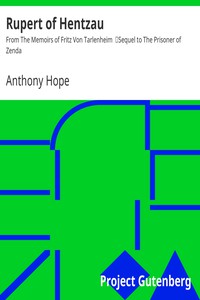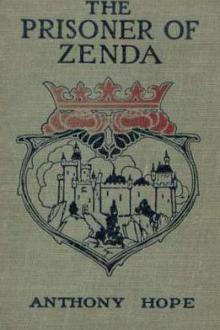Rupert of Hentzau: From The Memoirs of Fritz Von Tarlenheim<br />Sequel to The Prisoner of Zenda, Anthony Hope [top 10 most read books in the world TXT] 📗

- Author: Anthony Hope
Book online «Rupert of Hentzau: From The Memoirs of Fritz Von Tarlenheim<br />Sequel to The Prisoner of Zenda, Anthony Hope [top 10 most read books in the world TXT] 📗». Author Anthony Hope
“Club him, you fools, club him!”
Thus exhorted, one jumped forward. The moment for hesitation had gone. In spite of the noise of wind and pelting rain, the sound of a shot risked much; but not to fire was death. Rudolf fired full at Bauer: the fellow saw his intention and tried to leap behind one of his companions; he was just too late, and fell with a groan to the ground.
Again the other ruffians shrank back, appalled by the sudden ruthless decision of the act. Mr. Rassendyll laughed. A half smothered yet uncontrolled oath broke from one of them. “By God!” he whispered hoarsely, gazing at Rudolf’s face and letting his arm fall to his side. “My God!” he said then, and his mouth hung open. Again Rudolf laughed at his terrified stare.
“A bigger job than you fancied, is it?” he asked, pushing his scarf well away from his chin.
The man gaped at him; the other’s eyes asked wondering questions, but neither did he attempt to resume the attack. The first at last found voice, and he said, “Well, it’d be damned cheap at ten crowns, and that’s the living truth.”
His friend—or confederate rather, for such men have no friends—looked on, still amazed.
“Take up that fellow by his head and his heels,” ordered Rudolf. “Quickly! I suppose you don’t want the police to find us here with him, do you? Well, no more do I. Lift him up.”
As he spoke Rudolf turned to knock at the door of No. 19. But even as he did so Bauer groaned. Dead perhaps he ought to have been, but it seems to me that fate is always ready to take the cream and leave the scum. His leap aside had served him well, after all: he had nearly escaped scot free. As it was, the bullet, almost missing his head altogether, had just glanced on his temple as it passed; its impact had stunned, but not killed. Friend Bauer was in unusual luck that night; I wouldn’t have taken a hundred to one about his chance of life. Rupert arrested his hand. It would not do to leave Bauer at the house, if Bauer were likely to regain speech. He stood for a moment, considering what to do, but in an instant the thoughts that he tried to gather were scattered again.
“The patrol! the patrol!” hoarsely whispered the fellow who had not yet spoken. There was a sound of the hoofs of horses. Down the street from the station end there appeared two mounted men. Without a second moment’s hesitation the two rascals dropped their friend Bauer with a thud on the ground; one ran at his full speed across the street, the other bolted no less quickly up the Konigstrasse. Neither could afford to meet the constables; and who could say what story this red-haired gentleman might tell, ay, or what powers he might command?
But, in truth, Rudolf gave no thought to either his story or his powers. If he were caught, the best he could hope would be to lie in the lockup while Rupert played his game unmolested. The device that he had employed against the amazed ruffians could be used against lawful authority only as a last and desperate resort. While he could run, run he would. In an instant he also took to his heels, following the fellow who had darted up the Konigstrasse. But before he had gone very far, coming to a narrow turning, he shot down it; then he paused for a moment to listen.
The patrol had seen the sudden dispersal of the group, and, struck with natural suspicion, quickened pace. A few minutes brought them where Bauer was. They jumped from their horses and ran to him. He was unconscious, and could, of course, give them no account of how he came to be in his present state. The fronts of all the houses were dark, the doors shut; there was nothing to connect the man stretched on the ground with either No. 19 or any other dwelling. Moreover, the constables were not sure that the sufferer was himself a meritorious object, for his hand still held a long, ugly knife. They were perplexed: they were but two; there was a wounded man to look after; there were three men to pursue, and the three had fled in three separate directions. They looked up at No. 19; No. 19 remained dark, quiet, absolutely indifferent. The fugitives were out of sight. Rudolf Rassendyll, hearing nothing, had started again on his way. But a minute later he heard a shrill whistle. The patrol were summoning assistance; the man must be carried to the station, and a report made; but other constables might be warned of what had happened, and despatched in pursuit of the culprits. Rudolf heard more than one answering whistle; he broke into a run, looking for a turning on the left that would take him back into the direction of my house, but he found none. The narrow street twisted and curved in the bewildering way that characterizes the old parts of the town. Rudolf had spent some time once in Strelsau; but a king learns little of back streets, and he was soon fairly puzzled as to his whereabouts. Day was dawning, and he began to meet people here and there. He dared run no more, even had his breath lasted him; winding the scarf about his face, and cramming his hat over his forehead again, he fell into an easy walk, wondering whether he could venture to ask his way, relieved to find no signs that he was being pursued, trying to persuade himself that Bauer, though not dead, was at least incapable of embarrassing disclosures; above all, conscious of the danger of his tell-tale face, and of the necessity of finding some shelter before the city was all stirring and awake.
At this moment he heard horses’ hoofs behind him. He was now at the end of the street, where it opened on the square in which the barracks stand. He knew his bearings now, and, had he not been interrupted, could have been back to safe shelter in my house in twenty minutes. But, looking back, he saw the figure of a mounted constable just coming into sight behind him. The man seemed to see Rudolf, for he broke into a quick trot. Mr. Rassendyll’s position was critical; this fact alone accounts for the dangerous step into which he allowed himself to be forced. Here he was, a man unable to give account of himself, of remarkable appearance, and carrying a revolver, of which one barrel was discharged. And there was Bauer, a wounded man, shot by somebody with a revolver, a quarter of an hour before. Even to be questioned was dangerous; to be detained meant ruin to the great business that engaged his energies. For all he knew, the patrol had actually sighted him as he ran. His fears were not vain; for the constable raised his voice, crying, “Hi, sir—you there—stop a minute!”
Resistance was the one thing worse than to yield. Wit, and not force, must find escape this time. Rudolf stopped, looking round again with a surprised air. Then he drew himself up with an assumption of dignity, and waited for the constable. If that last card must be played, he would win the hand with it.
“Well, what do you want?” he asked coldly, when the man was a few yards from him; and, as he spoke, he withdrew the scarf almost entirely from his features, keeping it





Comments (0)